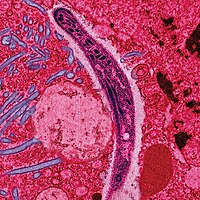
Photo from wikipedia
Mycobacterial pathogens, including nontuberculous mycobacteria (NTM) and Mycobacterium tuberculosis, are pathogens of significant worldwide interest owing to their inherent drug resistance to a wide variety of FDA-approved drugs as well… Click to show full abstract
Mycobacterial pathogens, including nontuberculous mycobacteria (NTM) and Mycobacterium tuberculosis, are pathogens of significant worldwide interest owing to their inherent drug resistance to a wide variety of FDA-approved drugs as well as causing a broad range of serious infections. Identifying new antibiotics active against mycobacterial pathogens is an urgent unmet need, especially those antibiotics that can bypass existing resistance mechanisms. ABSTRACT Mycobacterial pathogens, including nontuberculous mycobacteria (NTM) and Mycobacterium tuberculosis, are pathogens of significant worldwide interest owing to their inherent drug resistance to a wide variety of FDA-approved drugs as well as causing a broad range of serious infections. Identifying new antibiotics active against mycobacterial pathogens is an urgent unmet need, especially those antibiotics that can bypass existing resistance mechanisms. In this study, we demonstrate that gepotidacin, a first-in-class triazaacenapthylene topoisomerase inhibitor, demonstrates potent activity against M. tuberculosis and M. fortuitum, as well as against other clinically relevant NTM species, including fluoroquinolone-resistant M. abscessus. Furthermore, gepotidacin exhibits concentration-dependent bactericidal activity against various mycobacterial pathogens, synergizes with several drugs utilized for their treatment, and reduces bacterial load in macrophages in intracellular killing assays comparably to amikacin. Additionally, M. fortuitum ATCC 6841 was unable to generate resistance to gepotidacin in vitro. When tested in a murine neutropenic M. fortuitum infection model, gepotidacin caused a significant reduction in bacterial load in various organs at a 10-fold lower concentration than amikacin. Taken together, these findings show that gepotidacin possesses a potentially new mechanism of action that enables it to escape existing resistance mechanisms. Thus, it can be projected as a potent novel lead for the treatment of mycobacterial infections, particularly for NTM, where present therapeutic interventions are extremely limited.
Journal Title: Antimicrobial Agents and Chemotherapy
Year Published: 2022
Link to full text (if available)
Share on Social Media: Sign Up to like & get
recommendations!